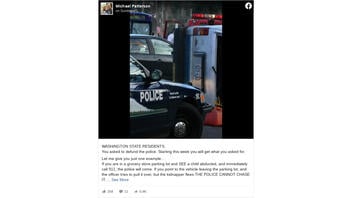
Would Washington state police reforms prevent officers from chasing a violent suspect? No, that's not true. A series of new laws do not prohibit police officers from pursuing a violent criminal even if they didn't witness the initial violent crime. A new law specifically allows peace officers to pursue someone in a vehicle if they are suspected of committing a "violent offense or sex offense."
The claim appeared in a July 18, 2021, Facebook post (archived here). It opens:
WASHINGTON STATE RESIDENTS:
You asked to defund the police. Starting this week you will get what you asked for.
This is what the post looked like at the time of writing:
(Source: Facebook screenshot taken on Thu Jul 22 19:33:59 2021 UTC)
The post shares theoretical situations where law enforcement officers in Washington would supposedly now be restricted from performing their duties after police reform laws were passed in 2021. From the post:
Let me give you just one example...
If you are in a grocery store parking lot and SEE a child abducted, and immediately call 911, the police will come. If you point to the vehicle leaving the parking lot, and the officer tries to pull it over, but the kidnapper flees THE POLICE CANNOT CHASE IT.That's because if the officer doesn't actually see the abduction happen, they only have 'an index of suspicion' as opposed to 'probable cause.'
This is not true according to the language in HB 1054, which addresses police chases. The legislation says peace officers are allowed to "engage in a vehicular pursuit" for a suspect if there is "probable cause" for violent offenses or sex offense:
NEW SECTION. Sec. 7. (1) A peace officer may not engage in a vehicular pursuit, unless: (a) (i) There is probable cause to believe that a person in the vehicle has committed or is committing a violent offense or sex offense as defined in RCW 9.94A.030, or an escape under chapter 9A.76 RCW; or
(ii) There is reasonable suspicion a person in the vehicle has committed or is committing a driving under the influence offense under RCW 46.61.502;
(b) The pursuit is necessary for the purpose of identifying or apprehending the person;
(c) The person poses an imminent threat to the safety of others and the safety risks of failing to apprehend or identify the person are considered to be greater than the safety risks of the vehicular pursuit under the circumstances; and
(d) (i) Except as provided in (d) (ii) of this subsection, the officer has received authorization to engage in the pursuit from a supervising officer and there is supervisory control of the pursuit. The officer in consultation with the supervising officer must consider alternatives to the vehicular pursuit. The supervisor must consider the justification for the vehicular pursuit and other safety considerations, including but not limited to speed, weather, traffic, road conditions, and the known presence of minors in the vehicle, and the vehicular pursuit must be terminated if any of the requirements of this subsection are not met.
Washington House Public Safety Committee Chair Roger Goodman spoke to Lead Stories via telephone on July 23, 2021, about the claims in the post and denied that police would not follow a car that had a suspected kidnapping victim inside:
Yes, that's enough for the police to have probable cause, if they said that. I mean everything's fact specific, right? But if someone says, 'That person just abducted my child that is driving away,' that's enough for the officer to have probable cause. It is not necessary for an officer to witness a crime being committed. That is the case with misdemeanors. But not felonies.
Goodman also denied that police won't be doing welfare checks, as the post claimed:
The police have always had the discretion to do welfare checks. And that doesn't change at all. If they're called to a scene where there's a mental health crisis and they should show up and there might be some different rules of engagement once they do show up because we're focusing on de-escalation and use of force as the last option. But not showing up or not responding to a call is not an option, that's the public expects the police to show up and respond to calls.


















